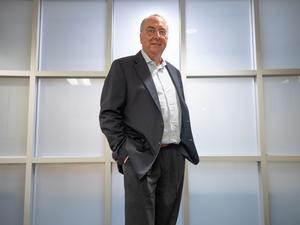
Robert Bolen wanted to help make life a little easier for people with disabilities.
So the D.C. entrepreneur — a teenager at the time — created a magnetic button to replace standard buttons on shirts, inspired by his friend’s son with cerebral palsy.
About nine years later, 24-year-old Bolen runs Button Helper, his startup that produces the product for people with Parkinson’s disease, arthritis, movement disorders and joint pain. And now, the company is gaining traction — initiating a national rollout, inking deals with health care and distribution organizations, and tapping big-name advisers to help guide the business in this next stage.
The launch kicks off this month, thanks to a partnership with minority and service-disabled veteran-owned business Pisces Healthcare Solutions, which aims to get Button Helper in front of new potential customers. Pisces, headquartered in Miami with an office in Sterling, sells medical and surgical supplies and equipment to health care facilities, doctors and patients — and counts all Department of Veterans Affairs hospitals and clinics among its customers. And under this agreement, its sales representatives will start demonstrating the Button Helper product to them and others nationally, and taking orders for the device, starting Feb. 10.
California nonprofit Desert Arc — which provides jobs to people with developmental and intellectual disabilities such as autism, Down syndrome, epilepsy and cerebral palsy — will then fulfill those orders on behalf of Button Helper and ship the products directly to veterans.
“This partnership allows us to serve veterans and active-duty soldiers across the country without delay,” Bolen told us. He declined to disclose financial terms of both deals, but said they stand to grow the startup’s customer base exponentially. The Department of Veterans Affairs alone counts 1,243 health care facilities and cares for nine million veterans every year, Bolen said. “Our partnership with Pisces will educate occupational therapists and purchasing agents on the quality-of-life improvements seen by veterans who use Button Helper.”
The startup is now adding direct-to-consumer sales to its menu, which Desert Arc is also supporting. That “will not only provide meaningful jobs to people at Desert Arc, but also allow us to lower prices,” Bolen said. A pack of 10 buttons currently sells for $20, now with written instructions in the packaging “which pushed our installation rate to zero in trials,” Bolen said. That’s also important, he said, for the many veterans who don’t have access to reliable internet.
Button Helper has named three new advisers to its board to support this national rollout: Norman Augustine, former chairman and CEO of the Lockheed Martin Corp.; Miles O’Brien, a longtime journalist and national science correspondent for "PBS NewsHour"; and Lance Robertson, a U.S. Army veteran and former Department of Health and Human Services assistant secretary for aging. Bolen otherwise runs the company himself and relies on subcontractors for additional support. He said he’s not hiring at this point.
The local startup became profitable in 2019 after landing its first wholesale order from Sunovion Pharmaceuticals Inc., which provides the product to attendees at Parkinson’s Foundation events across the country. That continues to garner recurring orders. Button Helper also operates a wholesale business through Amazon, which sells the product through its Zappos Adaptive division — and likewise represents an important revenue stream for the company. Bolen said he expects sales through the website this year to reach the same volume of sales with Amazon, which increased 50 times from 2020 to 2021.
In addition, Button Helper sells to the U.S. government, via the Department of Veterans Affairs. The business recently went through a pilot program at the Polytrauma System of Care at Hunter Holmes McGuire VA Medical Center, and showed its magnetic buttons — which speed up and simplify the buttoning process — decreased dependency of disabled veterans. Button Helper has also filed for its fifth patent for a more durable, thinner iteration of its product. That’s the version the company is now preparing to make available across the U.S. by spring.
Bolen, a Georgetown University McDonough School of Business alum, took home a $30,000 prize at the school’s Bark Tank pitch competition in October 2020, after working with MedStar Georgetown University Hospital neurologists to develop the product. He has otherwise self-funded the company to date, thanks to savings from working as an event photographer, and doesn’t plan to raise capital this year, he said. He was a Washington Business Journal and DC Inno 25 Under 25 honoree in 2021.




